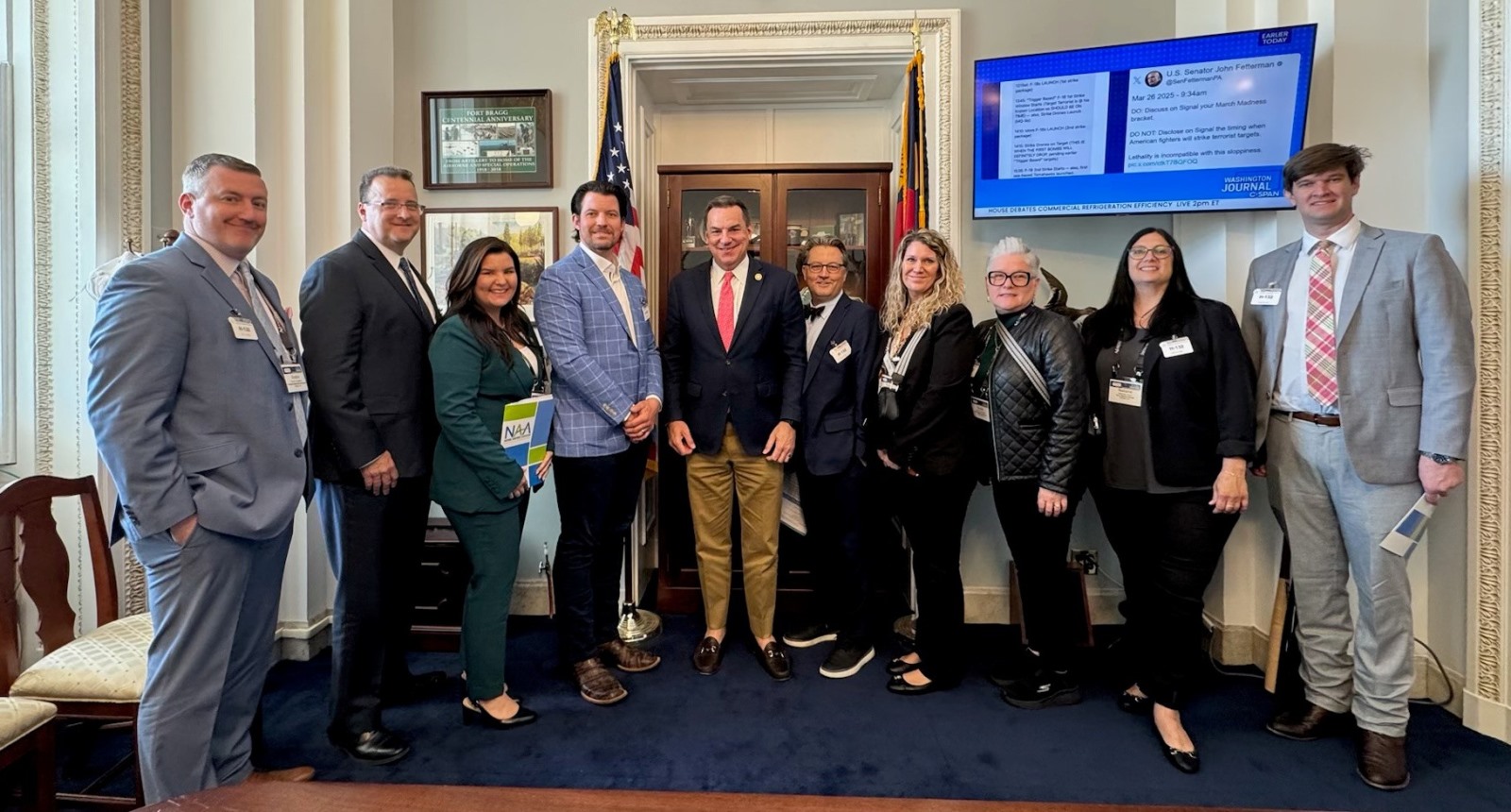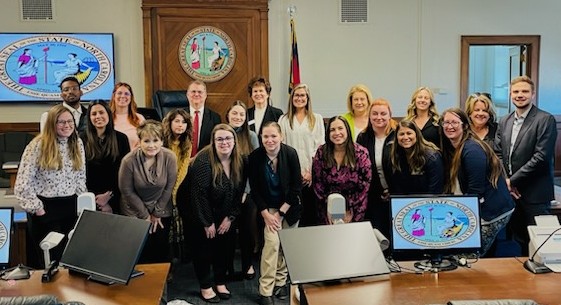AANC Government Affairs Update | March 27, 2025
NATIONAL UPDATE | NAA Advocate
NC Affiliate staff and volunteers have been busy on Capitol Hill this week, as they participate in the National Apartment Association's annual advocacy conference, Advocate. Rental housing suppliers, property managers, and owners and operators join affiliate staff to meet with their representatives and discuss issues affecting the multifamily industry.
 AANC President Karen Perkins is joined by several AANC board members, plus over 50 industry representatives from across North Carolina, along with NC Affiliate staff, to meet with NC Senators and Representatives. Discussions will be around state housing laws and tax legislation and will include:
AANC President Karen Perkins is joined by several AANC board members, plus over 50 industry representatives from across North Carolina, along with NC Affiliate staff, to meet with NC Senators and Representatives. Discussions will be around state housing laws and tax legislation and will include:
Respect State Housing Laws Act
-
The CARES Act (March 2020) created a temporary 120-day eviction moratorium and 30-day notice requirement for federally-backed housing, which conflicted with state notice periods averaging six days.
-
Ambiguous language in the CARES Act led to the Biden Administration enforcing the 30-day notice well beyond the intended emergency period, creating confusion and legal challenges nearly five years later.
-
Prolonged enforcement harms housing providers and renters, leading to unrecoverable rent debt, especially impacting “mom-and-pop” and affordable housing operators.
-
Eviction is always a last resort; professional housing providers prioritize keeping residents housed and only proceed when communication efforts fail.
-
Rising operational costs, like a 26% average increase in property insurance (2023), strain apartment communities, where 93 cents of every rent dollar covers expenses and local taxes.
THE ASK:
The National Apartment Association urges Congress to pass the Respect State Housing Laws Act (H.R. 1078) to clarify the CARES Act expiration and restore eviction policy authority to the states.
Tax Legislation
- The U.S. must build 4.3 million new apartment homes by 2035 to meet demand and ensure long-term housing stability and affordability for 40 million renters.
- Short-term spikes in apartment completions won’t solve the long-term housing shortage — Congress must prioritize policies that increase housing supply at all price points.
- Tax policy is critical — Congress should preserve key provisions of the 2017 Tax Cuts & Jobs Act (TCJA), including reduced individual tax rates, the 20% pass-through deduction (Section 199A), and the doubled estate tax exemption.
- New tax incentives are needed to boost housing supply, such as expanding the Low-Income Housing Tax Credit (LIHTC), supporting workforce housing, revitalizing Opportunity Zones, and promoting adaptive reuse of commercial properties into housing.
- Congress must protect current tax provisions essential to housing development by rejecting harmful proposals like eliminating like-kind exchanges, taxing carried interest as ordinary income, or restricting pass-through deductions.
- A multi-faceted, pro-housing tax strategy is vital for the health of the rental housing sector, ensuring economic growth, housing affordability, and stability for millions of American households.
THE ASK:
We urge Congress to PRESERVE critical tax provisions, PROTECT against harmful tax increases, and ENACT pro-housing policies that strengthen our nation’s housing supply.
NC UPDATE | Disaster Recovery
Information provided by McGuire Woods
House Bill 47/Session Law 2024-2: Disaster Recovery Act of 2025 – Part I was officially signed into law last week by Governor Josh Stein. Lawmakers agreed to a total spend of $528 million. Included in the final version of HB 47 is $120 million for a housing repair and reconstruction program, $200 million for agricultural needs including crop losses, $55 million for grants for local governments for infrastructure repairs, and $9 million for a voluntary summer school program, as well as several other agreed upon programs for recovery. There is also a provision in HB47 that delays the implementation of a new building code for at least a year. This is a positive development for the industry and we will cover the issue in greater depth in a future update.
HB 47 also includes $217 million for the North Carolina Office of Recovery and Resiliency (NCORR) to complete homeowner recovery projects for victims of hurricanes Matthew and Florence in the eastern part of the state. This appropriation comes with strict deadlines and reporting requirements as legislative leadership has made it clear that this will be the last of the state funding for NCORR.
The estimated damages caused by Hurricane Helene total over $60 billion, an amount that state financial advisors and lawmakers have acknowledged may never get full funding. However, both state legislators and Governor Stein have said that hurricane recovery in Western North Carolina will continue to be a priority throughout the legislative session.
GREATER CHARLOTTE AREA UPDATE
Information provided by GCAA
Charlotte city council members have been actively discussing potential updates to the Charlotte Minimum Housing Code for several months. Throughout this process, GCAA has been closely involved. The next meeting of the City Council’s Housing, Safety, and Community Committee will be on April 7, when it is expected a formal recommendation to the council will be made. Details on the outcome of this meeting will be shared in a future update.
PIEDMONT TRIAD UPDATE
Information provided by PTAA
The City of Greensboro held the State of the City address last week and touched on some of the economic development the city is experiencing, as well as the Road to 10,000 housing plan. Additional points of note include rezoning a few areas in District 1 for residential, their recent efforts dedicating $11 million for homelessness, issuing 3,300 residential building permits last year, and overall efforts to expand access to affordable housing.
Greensboro Planning and Zoning approved the first phase of the Villages at Summerfield Farms via annexation and re-zoning request. This project's long journey was (heavily) due to the inclusion of multifamily, which was less than warmly received in Summerfield.
Regulatory Reform Listening Session
The PTAA attended a listening session with NC Senators Steve Jarvis, Tim Moffitt, and Tom McInnis, all with the Senate Regulatory Reform Committee. This was a very pro-development discussion, held as part of what the Senators see as the next step of regulatory review to help sunset and fix state regulations over the next few years. AANC continues to do much work in this realm, and we’re excited to continue our efforts to work with BHP, TREBIC, and lawmakers to address the housing shortage by increasing supply through forward-looking regulatory reforms.
Patrick Bowen to Speak on Multifamily Housing
The PTAA is hosting Patrick Bowen with Bowen National Research on the morning of April 15, 2025, to speak specifically about the multifamily components of his recent North Carolina-focused housing reports. The recent releases of his regional report on the Carolina Core and the report on the whole State of North Carolina have helped bring housing policy into the spotlight. This is our opportunity to dig into his data and discuss multifamily in the Triad. Find more information and registration here.
TRIANGLE UPDATE
Information provided by TAA
The TAA Government Affairs Committee (GAC) recently welcomed Jack Datin from Senator Tillis’s office as a guest speaker. He provided updates on key federal legislative developments and shared the Senator’s priorities. Future events include:
- TAA’s GAC will be hosting Sharon Peterson, Long Range Planning Administrator at Wake County Planning, Development, and Inspections Division. Her team collects and analyzes population and growth data, reviews trends, and provides valuable insights for policy-making and land use planning decisions.
- Jason Brenner, Senior Staff Member and Staff Attorney at Durham Housing Authority, will be speaking with TAA’s HASC. We look forward to hearing updates on the latest developments in Bull City.
WESTERN NC UPDATE
Information provided by AAWNC

Page Morgan from Loebsack & Brownlee provided an informative overview of how to prepare for Magistrates Court and answered questions from attendees. AAWNC also welcomed Judge Knight from Buncombe County, who shared valuable insights and addressed participant questions. The meeting was well attended and provided a great opportunity for engagement and learning about Magistrates Court.
